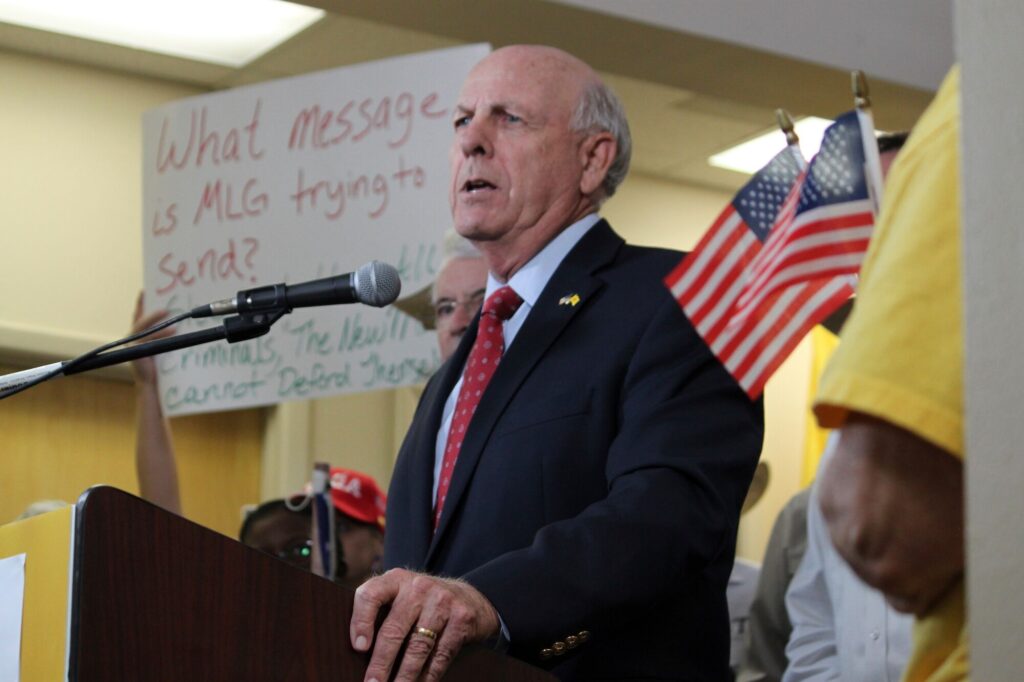How Colorado’s congressional delegation voted this week

S. 2372: VA Mission Act of 2018
This was a vote to pass S. 2372 in the Senate.
This $55 billion package to overhaul the U.S. Department of Veterans Affairs’ health care system passed by an overwhelming majority, including votes of approval from both of Colorado’s U.S. senators.
The five-year spending bill expands the right of veterans to seek health care from private doctors with taxpayers paying the bill. The House already passed its version of the same bill.
The VA Mission Act fulfills a campaign promise for President Donald Trump.
The legislation seeks to remedy shortcomings in VA health care that included long delays and employees falsifying records of patient wait lists. The immediate response by Congress was the “Choice” program, which authorized about one-third of veterans to be treated by outside doctors.
From the first, it was plagued by complaints by doctors about slow or nonexistent payments. Some veterans said the bureaucracy and procedures stifled their efforts to be treated.
The VA Mission Act will give an additional 640,000 veterans options for health care outside the government system. It also is supposed to reduce bureaucratic obstacles.
Colorado U.S. Sen. Michael Bennet said, “Based on feedback from Colorado veterans, this bill puts in place policies to bring down wait times, reduce barriers for community providers and recruit and retain medical professionals.”
Some veterans groups expressed concern the VA Mission Act was moving the VA too much toward privatized health care.
Passed.
S. 2155: Economic Growth, Regulatory Relief and Consumer Protection Act
This was a vote to pass S. 2155 in the House.
S. 2155 is an effort to roll back regulations of the 2010 Dodd-Frank Act that were enacted to prevent a repeat of the recession that started in 2008. Dodd-Frank required strict credit and accounting standards among lending institutions that some Republicans said crimped the financial industry and segments of the entire economy.
Their most common complaint was that Dodd-Frank did not distinguish between the biggest banks that shared most of the blame for the financial crisis and small community banks, many of which did nothing wrong.
The bill approved by the House this week would allow banks with $50-to-$250 billion in assets to operate with less regulatory oversight from the Financial Stability Oversight Council. Banks with less than $10 billion in assets would be exempt from the Volcker Rule that now prohibits them from potentially speculative trades.
In addition, the Federal Reserve would be required to consider the size of bank when making new regulations. The provision seeks to avoid the “one size fits all” rules that fell hardest on small banks.
The Trump administration supported the bill with a statement saying, “Specifically, the bill would advance the principles of: (1) fostering economic growth; (2) making regulation efficient, effective and appropriately tailored; and (3) empowering Americans to make independent financial decisions and informed choices in the marketplace.”
The bill’s critics included Colorado U.S. Rep. Ed Perlmutter, D-Golden, who said, “I believe we must learn from our past and never let something like the 2008 financial crisis happen again. I helped write Dodd-Frank, which included heightened regulatory standards for large financial institutions important to the stability of our economy. This bill would roll back those protections and unnecessarily increase the asset threshold for systemically important financial institutions by five times.”
Passed.
H.R. 2: Agriculture and Nutrition Act of 2018
This was a vote to pass H.R. 2 in the House.
This bill was defeated by Democrats and 30 Republicans who crossed the aisle.
H.R. 2 is agribusiness-friendly legislation that failed largely because of Republican congressional critics who said the House leadership did not adequately protect against illegal immigration. They were concerned the bill downplayed problems from illegal immigrants employed as low-wage farm workers with only minimal risk of losing their jobs or being deported.
Other opposition was raised by Democrats over provisions in the bill that cut funds for food stamps and would reduce regulatory environmental control over agricultural businesses.
H.R. 2 was supposed to have been a reauthorization of a five-year policy governing food and farms. Even on the House Agriculture Committee it faced skeptics. They said it would make the nation more dependent on factory farms and foods produced with pesticides and fertilizers.
The strongest industry support came from the American Farm Bureau Federation, which represents dairy, corn, wheat and beef producers. They said the bill would allow them to produce bigger harvests without fear of an unnecessary regulatory backlash.
Its opponents included the National Farmers Union, the Sierra Club and advocates for low-income persons who use food stamps. Athan Manuel, director of public lands protection for the Sierra Club, said in a statement, “This bill is massively, and rightly, unpopular as today’s vote demonstrated. It’s time for House Republicans to return to the drawing board and create a bipartisan solution that protects families and our environment.”
Failed.
On the Nomination PN1857: Gina Haspel of Kentucky to be Director of the Central Intelligence Agency
The Senate made Gina Haspel the first woman to lead the Central Intelligence Agency with its confirmation vote.
Opponents in the 54 to 45 vote of approval expressed misgivings about her suspected role in brutal detentions and interrogations of accused Muslim extremists after the Sept. 11, 2001 terrorist attacks.
Haspel had been serving as the CIA’s deputy director and a career officer overseeing covert operations, such as for Iran, Russia and North Korea. The CIA’s investigation of possible Russian meddling in the last presidential election drew criticism from President Donald Trump, who questioned the agency’s judgment.
Senators during Haspel’s confirmation hearing asked her repeatedly about her oversight in 2002 of a secret prison in Thailand, where a suspected al-Qaeda operative was waterboarded. They also asked whether she influenced the CIA’s destruction in 2005 of videotapes of enhanced interrogation techniques authorized by the George W. Bush administration.
Democrats and a few Republicans asked Haspel for assurances she would not allow torture under her leadership of the CIA. She agreed to the request.
She wrote in a letter to Sen. Mark Warner of Virginia, the top Democrat on the Senate Intelligence Committee, “While I won’t condemn those that made these hard calls, and I have noted the valuable intelligence collected, the program ultimately did damage to our officers and our standing in the world.”
Haspel’s nomination won support from long-time CIA employees, who were concerned about the hardline Republican policies of Mike Pompeo, the previous CIA director. Pompeo left the position to become secretary of state. Haspel is known for avoiding partisan policies.
“She has the backing of both Republicans and Democrats in the Senate, but most importantly she has the unequivocal support from the courageous men and women that served alongside her at the CIA.,” said Colorado U.S. Sen. Cory Gardner, R, who voted for Haspel.
However, Colorado U.S. Sen. Michael Bennet, D, who voted against her, said, “I voted no because I am concerned about the president’s stated position on torture. The use of so-called interrogation techniques harmed our nation’s standing in the world and it is critical that we move past that dark period of the agency’s history.”
Confirmed.
NO: Michael Bennet, D, COYES: Cory Gardner, R, CO














